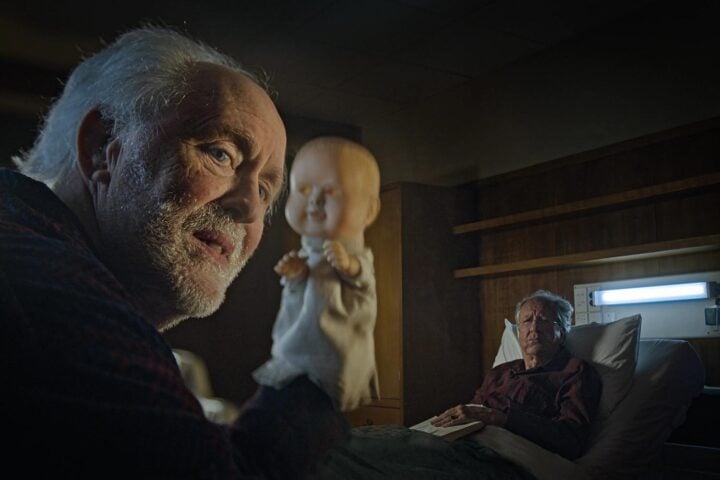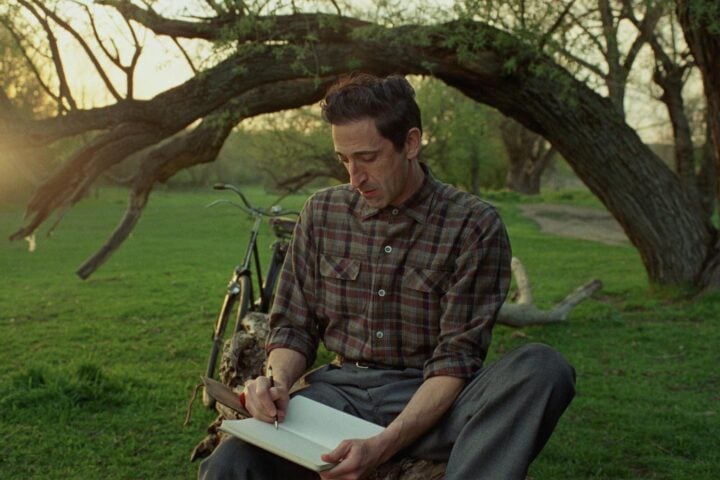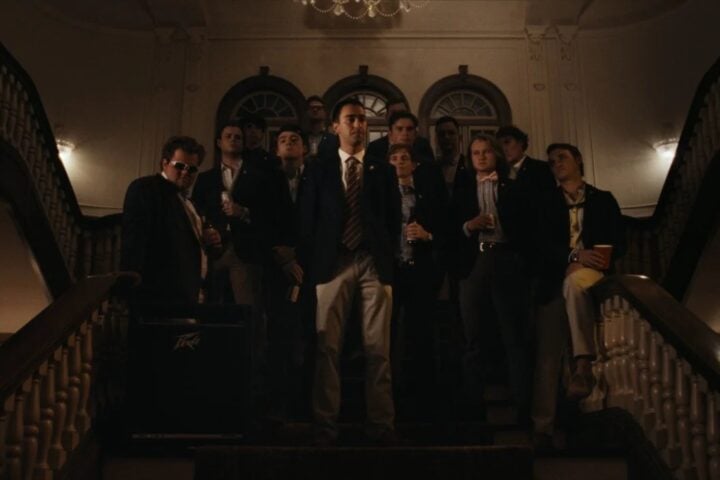Adapted from Robert Harris’s 2016 novel of the same name, Conclave begins with Cardinal Thomas Lawrence (Ralph Fiennes) rushing to the dying pope’s bedside. The cardinal’s panicked breathing echoes through the Vatican as he rushes through the darkened halls, and it’s a solemn opening to a film burdened with heavy questions about faith and ambition. But as we watch another clergyman wrench the Piscatory Ring from the dead pope’s finger with a grunting awkwardness that lends the moment an air of morbid slapstick, it’s clear that Edward Berger’s film isn’t afraid to indulge in a few earthly pleasures along the way.
As the dean of the College of Cardinals, it falls on Lawrence to put together the titular event—a gathering within the Sistine Chapel of cardinals from around the world to vote on which of them will become the new pope. The frontrunners look to be the progressive Cardinal Bellini (Stanley Tucci), who hopes to keep pushing the Catholic Church in the direction of inclusion and open-mindedness, and the ultra-conservative Cardinal Tedesco (a gleefully villainous Sergio Castellitto), who’s still pissed that the Church got rid of the Latin Mass 60 years ago.
There are other candidates to be considered too, like the affable Cardinal Adeyemi (Lucian Misamati), who could become the church’s first Black pope—an optics win for progressives, undermined by his brutally regressive views. Then there’s the last man to meet with the pope before his death, Cardinal Tremblay (John Lithgow), and a mysterious new arrival from Kabul, Cardinal Benitez (Carlos Diehz). The secretive circumstances of Tremblay’s meeting and Benitez’s appointment are just a couple of the things done in the dark that will be brought to the light over the course of the election, as Conclave weaves an engrossing tale that always seems to have one more twist left up its billowy sleeves than you’re expecting.
During the voting process, the cardinals have to be sequestered away from the world to ensure that no outside influences can affect their decision-making. It’s a cunning setup for a simmering locked-room thriller, trapping these men and their secrets in a single location that becomes more tense with each new round of voting. And it helps that the cardinals, though pious men of God, behave like jealous high schoolers vying to become class president—dividing themselves into canteen cliques and gossiping incessantly about their rivals.
Of course, sequestering oneself isn’t as easy as it was a century ago. When Lawrence asks about the foreboding shutters being installed in the Vatican, he’s told that modern spying technology can use lasers to detect vibrations in the windows. An almost 600-year-old building being equipped to repel digital-age espionage techniques is an anachronistic notion, but this collision of the ancient and the modern, the archaic and the everyday, is Conclave’s central tenet.
The contrast leads to some funny images, like Tedesco puffing away on a vape pen that matches the ruby red of his vestments. In fact, Conclave seems to have struck on the fact that watching men in full cardinal garb do anything even faintly modern—like scrolling on a smartphone or pouring a coffee from a fancy espresso machine—can be quite amusing. But there’s a sense of melancholy to all of this too, etched across Lawrence’s face as he gazes up sadly at those shutters—the desperate measure needed to protect the Church from a millennium that it wasn’t built for.
Watching the candidates rise and fall over the course of the election makes for a compelling spectacle, and Conclave has a knack for adding another wrinkle to the race at just the right time to maintain the suspense. But the actual power struggle between the liberal and conservative wings of the Church is less interesting, rendered in fairly simplistic, Sorkinian terms that reduce the main players to charismatic but clearly evil reactionaries like Tedesco and kind-hearted, weak-willed progressives like Bellini. They take turns making speeches at one another—and, in true Sokrinian fashion, the speeches in Peter Straughan’s script are excellent—but there’s only so much wisdom to be gleamed from a conflict where one side thinks that the Catholic Church’s biggest problem is that it simply isn’t xenophobic enough anymore.
Its pantomime villains aside, Conclave is a film about men who are doing their best to serve God, even if they don’t quite understand their place in His design. And that’s sort of where performers like Fiennes and Tucci find themselves too as, relying on the soulfulness of their performances to carry them through the hazier aspects of their roles.
Lawrence has been undergoing a crisis of faith while Bellini sees the prospect of inheriting the papal miter as more a burden than a blessing. But the film never really digs into the nature of Lawrence’s doubts, while the speed at which Bellini goes from “I don’t think I want to be pope” to “I cannot believe you people aren’t going to make me pope” is jarring. But even when the personal battles they’re fighting are a little hard to parse, Fiennes’s weariness and Tucci’s warmth fill out their characters in a way that keeps us fully aware of the human beings beneath the crimson robes, elevating Conclave into more than an enjoyably catty costume drama.
Since 2001, we've brought you uncompromising, candid takes on the world of film, music, television, video games, theater, and more. Independently owned and operated publications like Slant have been hit hard in recent years, but we’re committed to keeping our content free and accessible—meaning no paywalls or fees.
If you like what we do, please consider subscribing to our Patreon or making a donation.





